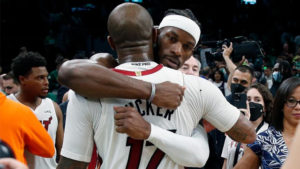 The game was in the hands of Jimmy Butler, as it should have been when he made a decision that will always be questioned. With less than 17 seconds left in the season for the Miami Heat, Butler quickly went for the win and tried to hit a three-pointer that would give his team their first lead of the game. He went out of action and was pinned by the Boston Celtics. win Game 7 of the Eastern Conference Finals 100-96. In doing so, they made their first NBA Finals appearance since 2010, leaving Butler and the Heat with plenty of “what if” questions.
The game was in the hands of Jimmy Butler, as it should have been when he made a decision that will always be questioned. With less than 17 seconds left in the season for the Miami Heat, Butler quickly went for the win and tried to hit a three-pointer that would give his team their first lead of the game. He went out of action and was pinned by the Boston Celtics. win Game 7 of the Eastern Conference Finals 100-96. In doing so, they made their first NBA Finals appearance since 2010, leaving Butler and the Heat with plenty of “what if” questions.
Butler was philosophical about a play that could well follow him for the rest of his career. “The thought process had to go to win, which I did” he said. “Missed, but I take this hit. My teammates liked the picture I took, so I live with it.”
The Celtics’ Jaylen Brown certainly didn’t expect Butler to miss, not after all the pain Butler had inflicted on his team all season. “When he shot it” Brown said after the game: “I’m like, dude, what the hell?”
Game 7 was a rough, ugly beast filled with undeniable officiating, incredible scoring, and endless stress for both fan bases. Only Celtics fans are likely to remember their team, which at one point had a 17-point lead but failed to buy a field goal in the last five minutes of the game.
Likewise, only Heat fans will remember bitterly that in the third quarter, Max Strus’ 3-pointer was deemed good on the floor, and then… many minutes later – was flipped for barely going out of bounds. Those were the three points that would have changed the whole face of that fateful Butler possession.
Instead, for most NBA fans, the enduring image of Game 7 will be of Butler choosing not to cut time before going for an easier game that ties the two. It’s unfortunate, because if it wasn’t for Butler, there wouldn’t even be a 7th game. His 47 points in game 6 combined with ridiculously sloppy handling of the ball from the Celtics, supported the Heat. On Sunday night, he had his second straight big game, scoring 35 points and was set to be the Eastern Conference Finals MVP (he went to Jason Tatum of the Celtics. instead of).
The story goes on
Connected: The Warriors’ return to the NBA Finals is an outstanding feat of resurrection.
Yes, Butler has only had 23.3% three-point shooting this season, but he’s almost unstoppable when the shooting streak is on. Playing overtime is a dubious decision when your team has worked its way through an extremely strong seven-game streak, especially considering Butler was on the floor for the full 48 minutes of the final. (As many have pointed out, Sunday night’s true winner was the well-rested Golden State Warriors, who ended their series against the Dallas Mavericks back on Thursday.)
The Heat were lucky that they even had the opportunity to win in those climactic seconds. The Celtics, the more talented team on paper, almost gave up the game, which was a common occurrence for them. Some of these problems have been due to the fact that this is a young team built around its homegrown core of 24-year-old Tatum, 25-year-old Brown, 28-year-old Marcus Smart and 24-year-old Robert. Williams (the last two were obviously limping due to injuries throughout the series).
Understandably, these young threesomes were up against the strongest team, the Heat, led by championship coach Eric Spoelstra. Fellow Celtics new head coach Ime Udoka almost certainly hopes they don’t continue to commit unforced losses and flagrant fouls to the much more dangerous Warriors.
Udoka’s de facto assistant was big man Al Horford, who is heading to his first NBA Finals at age 35 during his second stint in Boston. For a long time, the Celtics tried to complete their young team with an All-Star point guard — first Kyrie Irving and then Kemba Walker — but neither fit.
During the off-season, team president Brad Stevens made the decision to send Walker to the Oklahoma City Thunder in place of Horford, who ultimately provided the stabilizing influence the team desperately needed. Fittingly, the last rebound was in his hands.
In the end, Heath made a questionable decision that decided the series’ outcome. If Butler capitalized on that open look – and he made a similar three-pointer earlier in the game – he would have established himself as an all-time Hit icon. Instead of being the hero of the Eastern Conference Finals, Butler would end up being remembered by some as the jackass of the series.
This is a completely unfair fate, but basketball is an unfair sport. Tough games often come down to one basket: there’s a reason the NBA is called a “do or miss” league. Butler decided to roll the dice for the highest risk, highest reward roll, rather than trying to get a tie that would still give the Celtics a chance to win.
That’s the kind of player he’s always been, and it’s that kind of approach that brought the Heat closer to their second NBA Finals in three seasons. Jimmy Butler has to hold his head up high.
